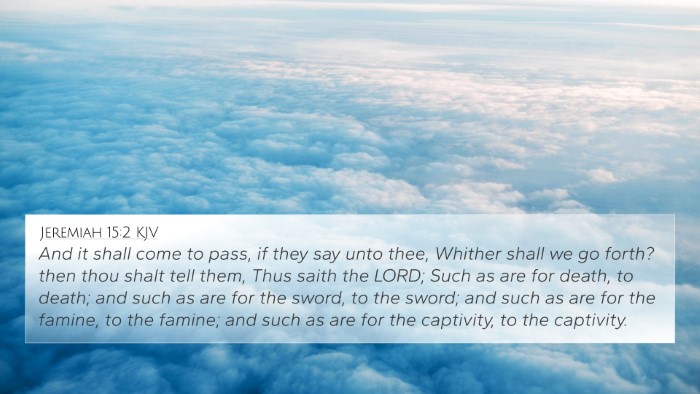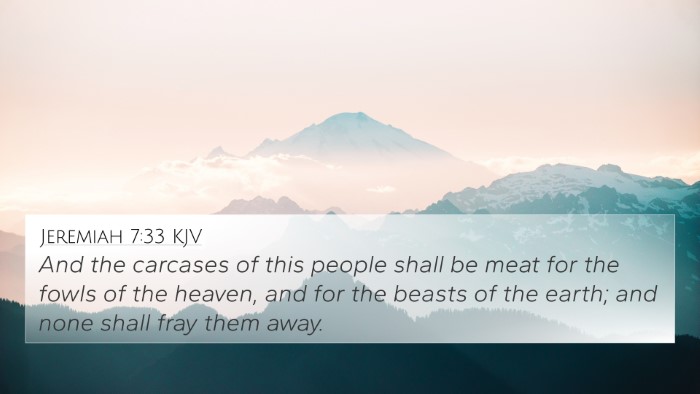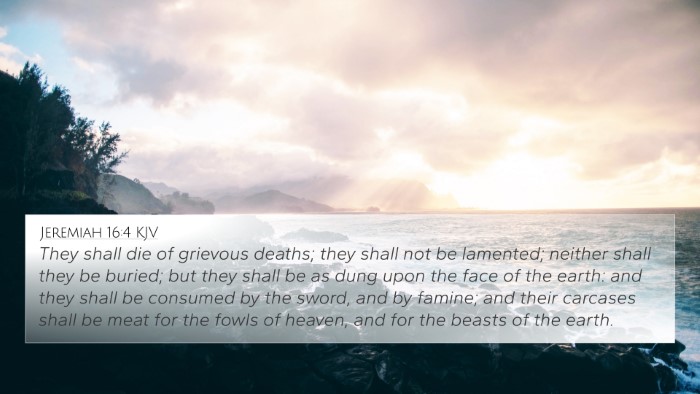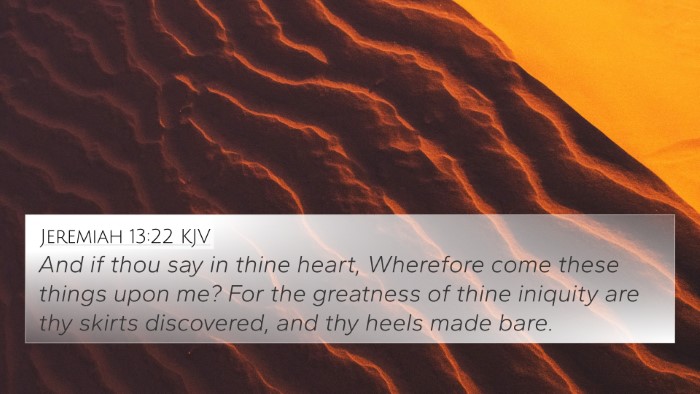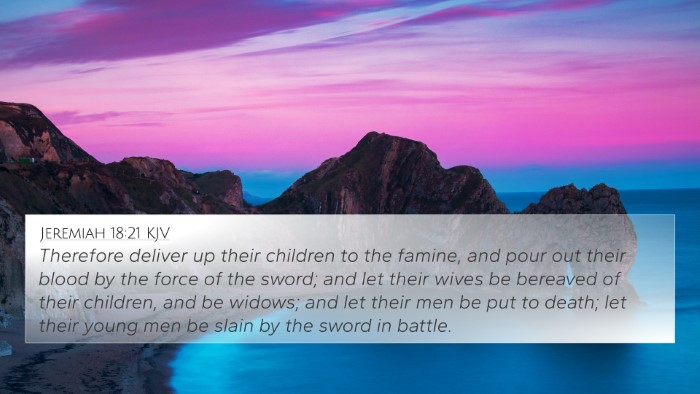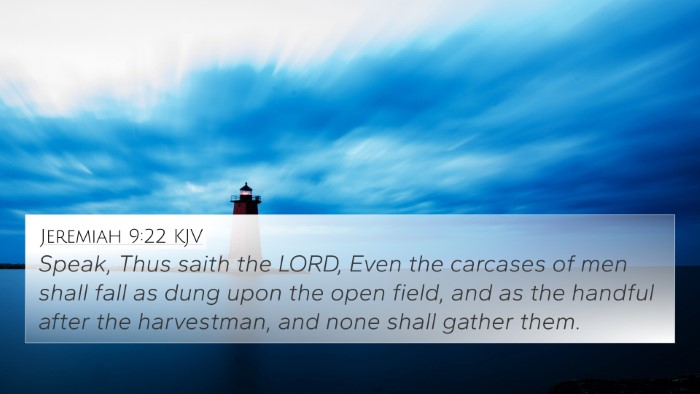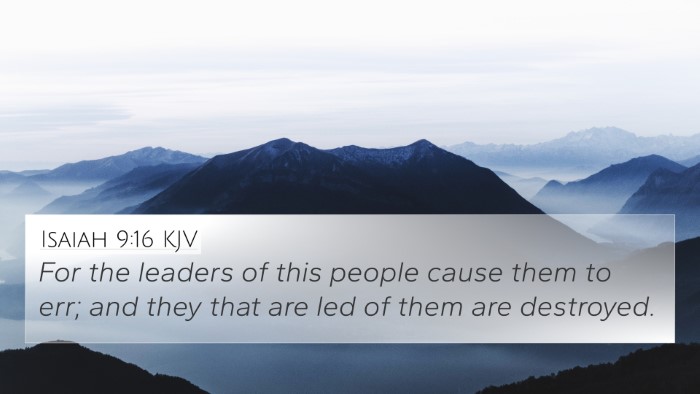Understanding Jeremiah 14:16
This biblical verse presents a sobering message about the consequences of disobedience and the realities faced by those who turn away from God. Through the insights garnered from public domain commentaries, we can derive a richer understanding of its implications.
Verse Context
Jeremiah 14:16 states:
"And the people to whom they prophesy shall be cast out in the streets of Jerusalem because of the famine and the sword; and they shall have none to bury them, them nor their wives, nor their sons, nor their daughters: for I will pour their wickedness upon them."
Commentary Insights
According to Matthew Henry, this verse conveys the dire consequences that befall those who heed false prophecies rather than the word of the Lord. The imagery of death and neglect depicts the seriousness of sin and God’s judgment. Henry emphasizes the moral decay of society and how it leads to despair and desolation.
Albert Barnes expands on this by highlighting the theme of judgment that permeates this verse. He points out that the consequences of the people's actions are severe and that the suffering mentioned is not random but a direct result of turning away from God. Barnes notes that the imagery serves as both a warning and a lament, indicating the gravity of their spiritual condition.
Adam Clarke further interprets this verse by linking it to the broader context of prophetic warnings. He underlines the uncaring nature of the individuals receiving the prophecies as they face impending doom. Clarke argues that the absence of hope in burial rites signifies ultimate rejection and loss from God's mercies, emphasizing the depth of their disconnect from divine favor.
Key Themes
- Divine Judgment: A core theme found in this verse is the certainty of divine judgment against wickedness.
- Consequences of Idolatry: The forsaking of God leads to severe consequences, reflected in the physical and social decay.
- False Prophecies: The role of false prophets as misleading figures who fail to deliver genuine messages from God.
- Community Despair: The communal aspect of suffering is highlighted, showcasing that individual sin can lead to collective punishment.
Bible Verse Cross-References
This verse can be linked with several other scriptures to deepen understanding and explore thematic connections, including:
- Deuteronomy 28:15–68: Discusses the curses for disobedience and its dire consequences.
- Lamentations 2:21-22: Reflects on the suffering in Jerusalem as a consequence of God’s judgment.
- Ezekiel 33:4-5: Stresses the responsibility of individuals to heed the warnings of destruction.
- Matthew 23:39: Jesus laments over Jerusalem, connecting past prophecies to His ministry.
- Romans 1:18-32: Outlines the wrath of God against unrighteousness and its manifestations.
- Isaiah 5:13: Indicates that people going into captivity due to a lack of knowledge.
- Jeremiah 5:12: Addresses the denial of God's words by the people and the consequences that follow.
Exploratory Connections
Through comparative Bible verse analysis, we can see the interconnectedness of scripture. The concept of judgment extends throughout both the Old and New Testaments, often highlighting the relationship between sin and its consequences.
- Connections between Old and New Testaments reveal a coherent narrative of human disobedience and divine response.
- Cross-referencing both Lamentations and Jeremiah illustrates a profound reflection on loss resulting from communal sin.
- Thematic Bible verse connections can be drawn with passages that address the plight of the downtrodden and the unresponsive to prophetic voices.
Tools for Bible Cross-Referencing
Understanding scripture in relation to itself can be facilitated by various resources and methods:
- Bible Concordance: A helpful tool for locating and studying related verses.
- Bible Cross-Reference Guide: Guides can help connect themes across different texts.
- Cross-reference Bible Study: Engaging in studies centered on interconnected verses can enhance comprehension.
- Bible reference resources: Various study materials are available to aid in investigating scriptural links.
Using Cross-References for Deeper Insight
To utilize cross-references effectively in Bible study:
- Identify key themes or phrases within a verse.
- Use a concordance to find verses that share similar keywords.
- Engage in thematic studies, comparing and contrasting different texts.
Conclusion
Jeremiah 14:16 serves as a poignant reminder of the dire consequences of abandoning God and the importance of true prophetic voices. It invites us to explore the depths of spiritual truth through connecting various Bible verses, revealing the rich tapestry of God's interaction with humanity. Embracing a comprehensive understanding through cross-referenced scripture deepens our insight into God's judicial nature and His unyielding call for repentance.





